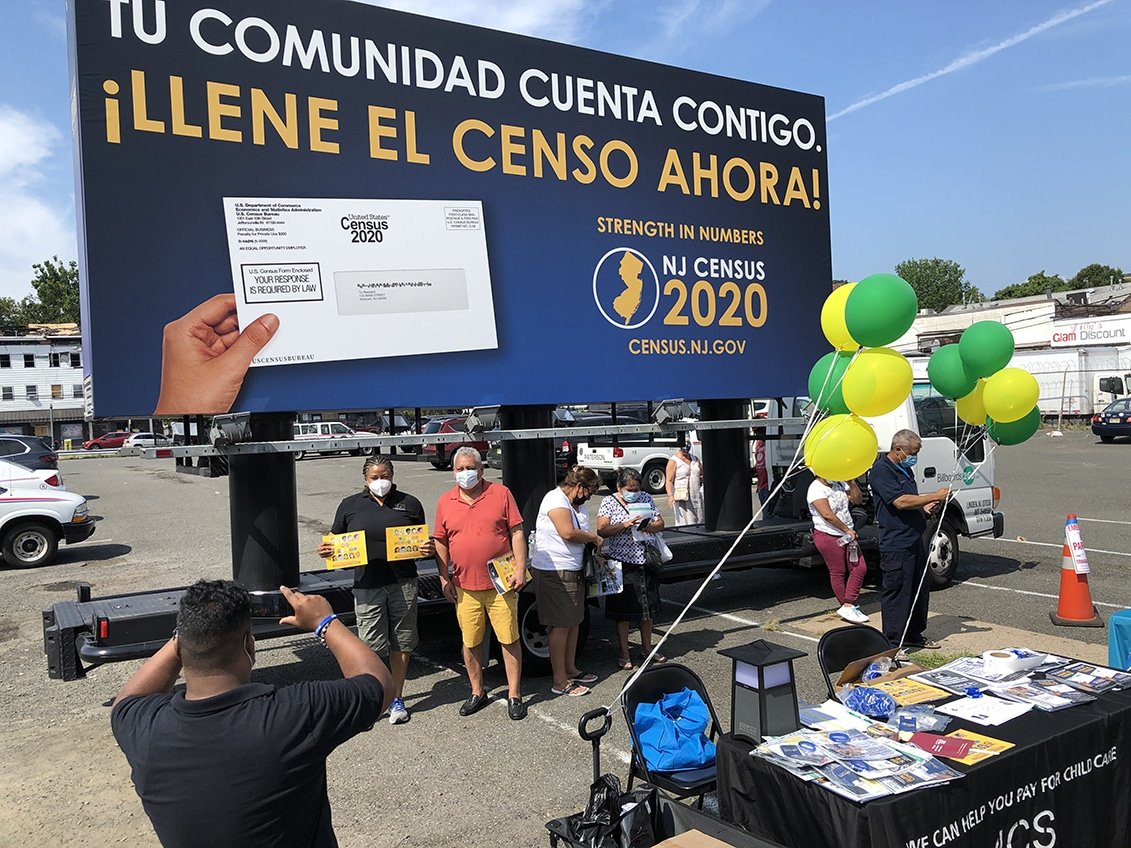By Kleibéel Marcano, Reporte Hispano
Editor’s note: This is the English translation of the original story, which was first published in Spanish for Reporte Hispano. This version has been updated and edited, with permission from the author(s) and publication(s), for length and clarity.
——
PATERSON, NJ — The 2020 Census has entered into the final stretch.
In less than a month, the population count will conclude, and despite the national and state campaign efforts to improve response rates in hard-to-count areas in New Jersey, the immigrant community in Passaic County has still not fully responded to the Census.
As of August 31, the overall self-response rate in Passaic County was 65.9%, according to the U.S. Census Bureau’s automatic rate map..
But that does not tell the entire story. In the cities of Paterson and Passaic—both with high Latino immigrant populations—the response rate was 51.1% and 59.2% respectively.
“In the urban areas of the county, only half of its population has responded; we need everyone to be counted,” said Passaic County Freeholder John W. Bartlett.
The low response rate has led community organizations and the local government to reinforce their campaign in five main languages that are widely spoken in the county: English, Spanish, Arabic, Bengali, and Gujarati.
“We have to drum up the message about the importance of the Census for all immigrant communities,” Bartlett said. “The funding for schools, hospitals, housing, public services, roads, infrastructures—everything depends on the Census figures.”
Bartlett, who sits on the Passaic County Complete Count Committee, noted that the “Census is unfamiliar to many immigrants,” so they have not paid attention to the questionnaire or fully understood its economic and political implications.
But he pointed out that the intimidation campaign that Pres. Trump carried out since the Census count started has had a negative impact on the response rates in the immigrant communities.
The Trump administration attempted last year to include a citizenship question in the questionnaire. The president also made an announcement in July to exclude undocumented immigrants from political apportionment.
“We cannot allow the president’s fear-mongering and intimidation to win, when it comes to representation in the society. The Census is safe and confidential. By law, people’s information cannot be shared,” Bartlett added.
Census in the time of pandemic
Anahí Gonzales, a member of Make The Road New Jersey, an immigrants rights organization that has been promoting the Census events in Passaic County, said that the pandemic has made the decennial count less of a priority in the Latino community.
“Before the pandemic, filling out the Census form was the third or fourth priority for people. When the contagion started, people forgot about the Census. Their concerns were suddenly about their survival — to ensure they have money to feed their families,” Gonzales said, adding that there is still fear among immigrants that their information will be shared with immigration enforcement authorities.
Gonzales explained that the areas most affected by the pandemic in Passaic are precisely the areas where there is a lower rate of Census responses.
Despite this situation, they continue with informational outreach and response efforts to educate the immigrant community about the importance of the Census. Last weekend, she and other members of Make the Road set up a Census kiosk at Pulaski Park, in Passaic, to promote the Census.
“We must send out more information on how the Census affects us, and that the time to participate is running out. I am concerned there is not a large campaign at the national level, reminding people about the September 30 deadline to fill out the Census questionnaire,” she said.
In addition to the economic and political implications of the Census, Gonzales says that it is essential for immigrants to engage in the decennial count to show the country about the [economic and political power of immigrants].
“[We want to show] that we are here and we are not leaving. They (government officials) cannot continue to ignore us or erase us from the lists,” she said. “Filling out the Census is a way to get us out of the [American] shadows.”
Funds based on 2010 Census are now being used to fight COVID
Bartlett noted that the COVID-19 pandemic, which currently affects the entire country, has demonstrated the importance of the population being counted in its entirety.
In the 2010 Census, 501,000 people were counted in Passaic County, while in the neighboring Morris County, about 494,000 people were counted.
When Congress passed the CARES Act in March to combat the effects of the pandemic, all counties in the country with a population equal to more than 500 people received funds directly from the federal government.
Passaic County received $87 million that has been used for COVID-19testing, personal protective equipment (PPE), food and other measures against the pandemic.
Morris County, like all other counties with less than half a million people, did not receive money directly from the federal government.
“Another pandemic may occur in the next few years. If we are not fully counted at this time, we may not receive the funds that are due to us. The money would go to other states and counties,” Bartlett said.
It is estimated that for every person not counted, the state and local city lose about $2,000 annually in federal revenue. This could represent millions of dollars over the next 10 years until the next count.
Bartlett reminded people that they can still fill out the Census online at www.2020Census.gov, by phone, by sending the questionnaire by mail, or through the enumerators who have visited homes, since August 11, that have not responded to the Census.
This story was part of the 2020 Census: New Jersey Media Counts program, an initiative of the Center for Cooperative Media at Montclair State University.

